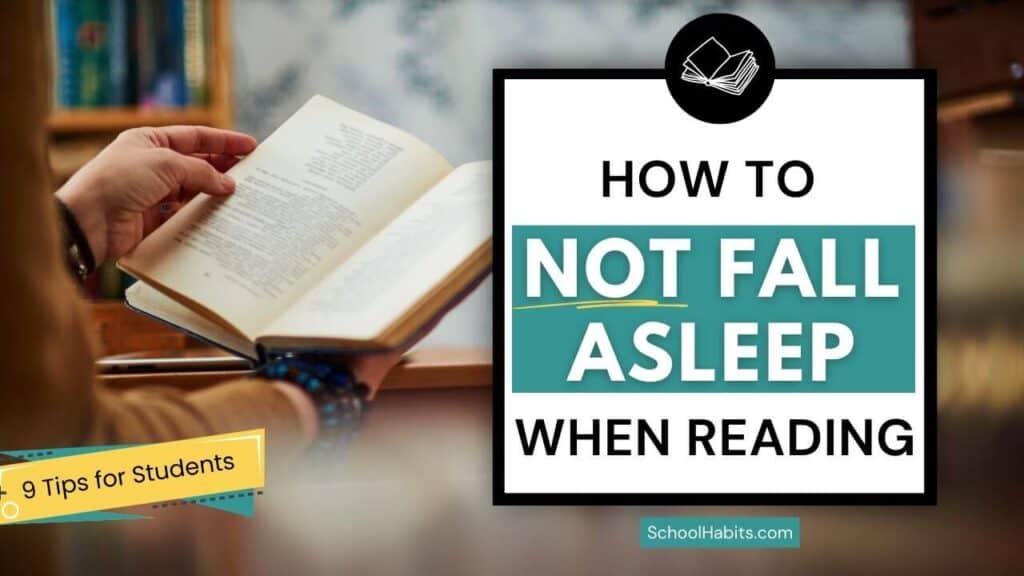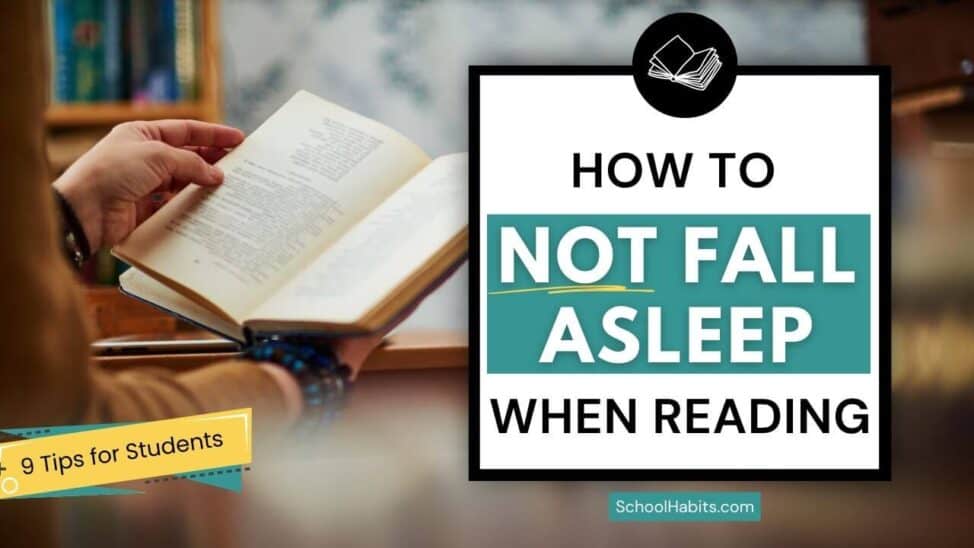
By Katie Azevedo, M.Ed.
We’ve all been there. We’ve all saved our reading homework until the end of the day because we had to do the “real” homework first, but then we start falling asleep after just a few pages.
Why does reading do this to us? How can we be wide awake one minute, and then literally fall asleep with a book on our face the next minute?
Why We Get Tired When Reading
There are many possible reasons why reading makes us tired. Here are the main ones:
- A medical condition*
- The book is boring
- You are tired already
- The book is too challenging
*If there’s a medical reason behind why you fall asleep while reading, you likely feel tired doing other activities as well – not just when you read. Consult a physician, because I am not one.
How to Not Fall Asleep When Reading
In this blog post, I teach you how to not fall asleep when reading by sharing 9 strategies that will increase your alertness and focus when you’ve got a book in your hands.
1. Don’t read in bed
Let’s start with the obvious one: don’t read in bed. Your bed is the strongest visual and physical trigger for sleep, and being in it (or even just seeing it) has the power to release the chemicals in your body that promote sleep. These are the chemicals you’re fighting against when you start to feel your eyelids droop.
Where should you read? Somewhere you can sit upright in a position that’s not uncomfortable but not super comfortable either. Think kitchen tables and library tables.
The one exception to this rule is if you read for pleasure as a way to wind down before bed. I do this, and it’s a great pre-bed activity.
2. Read under bright or natural light
Lighting makes a difference in our alertness. Warm and soft lighting is a vibe, yes, but it’s not the right vibe if you’re struggling to stay awake. If you’re reading during the day, use the power of natural light. If you’re reading at night, you obviously can’t use natural lighting, so pop a natural or cool light bulb into your lamp.
3. Avoid sleep triggers
I’ve already explained the reason you shouldn’t read in bed (because your bed is a strong sleep trigger). But there are other sleep triggers to avoid, too: your pajamas, the blankets from your bed, and even your bedroom itself.
When your brain perceives anything at all related to sleep, you send it a signal to begin the shut-down process. This is not what you want when you’re trying to stay awake.
4. Take breaks at predetermined intervals
Reading is a cognitively demanding task. It takes concentration, self-monitoring (did I understand that?) and nearly “all of the regions of the brain, because it involves all cognitive functioning of humans –verbal and non-verbal” (Siusana Kweldju). In other words, reading can be exhausting, and we should take breaks when reading large amounts of text.
I suggest taking a short 5-minute break from your reading at predetermined intervals. Depending on the text you’re reading, you could take a break after every chapter or two, after a certain amount of pages, or after a period of time (like 25 minutes). If planning breaks after a certain amount of time, use an actual timer.
Figuring out ahead of time when your breaks will be can increase your motivation to stay awake because you know when your next stopping point is. Without knowing ahead of time when your breaks will be, your brain perceives the task as “endless” – which can decrease your alertness.
A note about breaks: Whatever you do, do not use your break to do anything that’s emotionally provocative, such as going on social media. When we use our breaks doing something that triggers strong emotions, it’s significantly harder to resume the work we were doing before the break. Here are some ideas of what to do during a break.
5. Don’t read at night
I’m repeating this exception from the first tip in the list: The one exception to this rule is if you read for pleasure as a way to wind down before bed.
What I’m really referring to here is not doing your academic reading at night. So many students do their “submittable” homework during the daylight hours, and save the reading until bedtime. I’m suggesting you flip it around and do your reading first. The reason is that you’ll be less likely to fall asleep while reading if you do it while you have more energy to begin with.
You might be wondering if doing it this way will make you more tired when you do your other homework at night? Not necessarily, because your other, more “submittable” assignments will likely involve more physical engagement (hold a pencil, write something down, answer a question, etc.): these micromovements can help you stay alert.
6. Read interesting things
Boring books are hard to stay awake for. If you can, pick more interesting books. If your book is required reading, then use any of the other strategies in this post and ALSO these 6 tips for how to read books when you don’t like reading.
On a related note, if you have trouble concentrating in boring classes, use my 6 tips for how to stay focused in a boring class.
7. Get enough sleep at night
If you’re exhausted and sleep-deprived, you’re likely to fall asleep doing even interesting tasks. If you’re exhausted and sleep-deprived, reading doesn’t stand a chance. I know you’ve heard this advice approximately 12 zillion times before, but you need 7-9 hours of sleep minimum. Stop messing with your hormones and biochemistry and figure out how to get more sleep.
8. Annotate
Annotating your text engages physical movement, which can increase alertness and help you not fall asleep when reading. Even just light annotations such as simple chapter summaries or using my Highlight and Rewrite Strategy can make a difference in how sleepy you feel. (Annotating also increases your comprehension of the text, which is a win-win.)
9. Make the reading relevant – give it a purpose
We don’t like tasks that are boring or irrelevant. When we don’t buy into the reason we’re doing something, we immediately lose motivation and – in the case of reading – can zone out or fall asleep if we attempt it.
If you’re stuck reading a boring book that’s required for a class, you need to find some way to make it relevant or meaningful to you. I understand this is easier said than done, but all mindset shifts that are valuable enough to impact your life are hard to make.
Here are three ways to make a boring book relevant, which can increase the chances of you not falling asleep when reading it:
- Read the book with the purpose of what you’ll be doing with the information after you read it. Will you be writing a paper on the book? Then read the book with the intention of searching for material to use in your essay.
- Read the book to actually learn from it, so that you can do well on your assessments. There’s a good chance you’ll be tested on what you’re reading, and it’s my guess that you care about your grades – even if you don’t care about the book. Can you get yourself to care about the book by caring about its impact on your grades?
- Read the book as an experiment on doing hard things. Figuring out how to not fall asleep when reading a book is most definitely not the hardest thing you’re going to have to do in your school or professional career. Sure, it’s a challenge, but it’s not the hardest one. However, you can use it as practice. You can use it as an experiment to prove to yourself that you can do hard things. If you don’t succeed, then at least you collect evidence that reveals what you need to work on.
Final Notes About Staying Awake When Reading
Obviously, I’m sharing the 9 tips in this post to help you not fall asleep when reading. But if staying focused when reading is more of a challenge for you, then you will want to read the tips I share here. Also, here’s my tutorial that contains 7 specific strategies for reading hard books.

